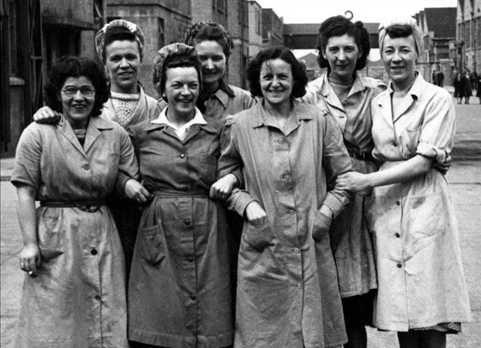Blog
The perennial problem of equal pay
Ten years ago, Close the Gap held an event, with support from Unison and the TUC, to celebrate the 40th anniversary of the equal pay strikes which eventually led to the passing of the Equal Pay Act in 1970. We were lucky to have two of the Ford Dagenham sewing machinists speak about their experiences of the strikes, and reflect on the significance of their actions. We also paid homage to Agnes McLean who led the Scottish fight for equal pay, first at Rolls Royce Hillington in 1943, and later in a series of strikes across the West of Scotland in 1968. The right to equal pay for equal work is fundamental to women’s labour market equality but, almost 50 years on, we’re still very far from that right being realised.

Today, 8000 low-paid women working at Glasgow City Council are striking over their claim for equal pay which has been rumbling on for 12 years. The work that they do as school staff, nursery workers, care workers, caterers and cleaners is integral to people’s lives and to the functioning of our economy. But historically, such “women’s work” has been systematically undervalued resulting in the low pay which characterises these jobs and sectors.
Although there have been a number of pay modernisation programmes in the public sector, there are still tens of thousands of equal pay claims in Scotland’s tribunal system. The public sector equality duty, which includes specific requirements for employers on equal pay, has also not resulted in the transformational change as was hoped.
The new gender pay gap reporting regulations have shone a welcome light on private and third sector employment practice. In spite of this, equal pay is largely missing from the public discourse on the gender pay gap. In April, Close the Gap did an analysis of Scottish employer reporting under the new gender pay gap information regulations, and we found that only two out of 200 reports mentioned an equal pay review or job evaluation.
Most pay discrimination isn’t intentional, and there are many employers who have taken steps to rectify the sex bias that was built into the design of their pay and grading systems. However, research by Close the Gap, and from the UK Government, shows that the main reason employers don’t take action on equal pay is that they believe they’re already paying their staff equally. This undue complacency coupled with, in some cases, a lack of will to advance women’s workplace equality creates the most significant challenges to realising equal pay and closing the gender pay gap.
A current focus for Close the Gap is our new Equally Safe at Work employer accreditation programme. Equally Safe at Work is an innovative programme which will be piloted in local government next year. We’ll be working closely with a small number of councils to support them to work towards accreditation by developing employment practice that both recognises the barriers to women’s workplace equality, and also violence against women-competent. Pay practice is an essential component of this, and we hope that Equally Safe at Work will encourage employers to be sector leaders in not just equal pay, but in women’s labour market equality more widely.
Challenging poverty means challenging women’s inequality at work
One of the key messages of this year’s Challenge Poverty Week is that poverty affects us all. At Close the Gap, we know that it affects women. We know this because the evidence shows that poverty in Scotland is gendered.
By this we mean that women are more likely to be in poverty than men; women are more likely to experience in-work poverty; women find it harder to escape poverty and are more likely to experience persistent poverty than men.
September monthly reading roundup
There are normally very few things that brighten up a Monday morning, but our monthly reading roundup is here just in time for an extra long coffee break (you deserve it!). September saw the marking of the first mothers’ equal pay day, parliament saw its first baby attendee and we all wished Serena Williams would be our best friend.
August monthly reading roundup
Our monthly news round-up is back! This month includes stories on the UK gender pay gap regulations, falling numbers of female apprentices, and unfair recruitment practice in higher education. Why not make yourself a cup of tea and take ten minutes out to catch up on our August bulletin on all things women and work?
Scot women shout out
Women’s campaign groups, equalities organisations, and individual gender advocates in Scotland do amazing things, often with very limited resources, and little attention. We are planning to highlight some of the people and groups making women’s equality happen, to celebrate their work and inspire others to take action. We’ll be doing this on Monday using the hashtag
